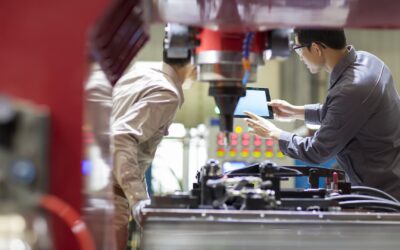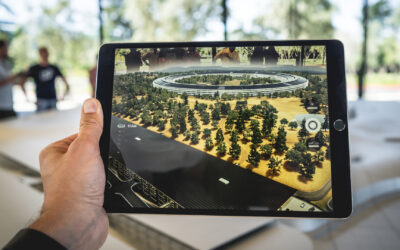3 Key Takeaways from Automation Alley’s AMHUB roundtable on Efficiency, Resiliency & Agility with Smart Manufacturing
Automation Alley, in partnership with The World Economic Forum, hosted a roundtable on “Efficiency, Resiliency & Agility with Smart Manufacturing” on April 27 as part of its 2022 Industry 4.0 roundtable series, which is centered around the most relevant and pressing issues facing advanced manufacturing today. As the World Economic Forum’s Advanced Manufacturing Hub (AMHUB) for Michigan, Automation Alley brings together leaders from industry, academia, and government to promote connections and collaborations, share best practices, and spark industry conversations around solutions as the global manufacturing ecosystem is impacted by technological, economic, environmental, and societal disruptions.
In this roundtable session, we uncovered manufacturing pain points around culture, finance, and technology on the journey to Industry 4.0 implementation, and discussed solutions aimed at boosting manufacturing efficiency, resiliency, and agility. By highlighting key regional opportunities and challenges, our ecosystem can better work together to accelerate Industry 4.0 and stay globally competitive.
Below are three key takeaways from the roundtable discussion.
CULTURE
You can’t implement new technologies successfully without first addressing talent needs
Today’s manufacturers are faced with mounting challenges when it comes to workforce development. The rapid pace of technological change in industry is making it increasingly difficult to find people with the right digital skillsets—whether that involves hiring new talent or retraining existing employees.
To combat this pain point, industry must prioritize working with academia to ensure a strong and highly skilled talent pipeline is entering into manufacturing jobs. This starts with exposure to manufacturing and coding at the elementary school level with the intent to continue engagement throughout the course of a student’s educational journey, from working with students on senior projects, to internships and apprenticeships.
And for the existing workforce, companies should identify a champion or group of champions within their organization with the skills required to drive technological change. These subject matter experts can train employees from multiple locations across the globe using AR/VR technology for decentralized support.
From a job seekers perspective, it’s important to note that today’s advanced manufacturing companies are looking for individuals with an entrepreneurial mindset. Experience often trumps a college degree in manufacturing. Companies are looking for individuals with problem-solving skills and leadership attributes who are self-starters and have a natural curiosity and willingness to learn.
FINANCE
Find your ROI & start small
Digital transformation will, for many manufacturers, be the difference between success and failure in coming years. But with so many technologies available for businesses today, it can be challenging understanding where to start, and what will bring you a return on investment. There will always be roadblocks when it comes to the expense of new technologies, however prices continue to fall, and more options are now available with technology as a service.
Manufacturers should remember to keep a digital mindset at the beginning of a new project and design engagement through multiple lines of the business to tie everything together. When manufacturers are looking at working smarter, it’s important to involve people from different areas of the business in both brainstorming and decision making.
There is no simple one-size-fits all answer or template for connecting legacy hardware with new software solutions, however, manufacturers should consider starting small and incorporating new technologies in stages to not disrupt production or quality.
TECHNOLOGY
Digital transformation means adopting a software-based business model
Manufacturers looking to boost productivity and profits while staying competitive and relevant in today’s fast-paced market need the right digital tools to ensure future success. Software has become the primary source of smart manufacturing innovation and should be at the heart of every manufacturer’s successful Industry 4.0 transformation. Companies that embrace a software-first business model will thrive in the digital era because they will be well positioned to pivot when unpredictable disruptions and market shifts occur.
Manufacturers should consider deploying digital solutions in a way that makes things repeatable and makes systems simpler for use by a wide array of people within the organization. Dashboards should be used to showcase data, and, as software interfaces continue to improve, it will enable even marginal users.
For those companies just beginning down the digital path, connect with peers in the manufacturing ecosystem and use the resources available. Consider a trip to a community innovation center to see what’s out there as you gradually move into Industry 4.0. Look for partners that can help you reimagine your business for future success.
A special thank you to our roundtable participants who contributed insights for this piece:
Justin Al-igoe, Macomb-St. Clair Workforce Development Board
Haissim Badih, Automation Alley
Sara Barton, University of Michigan – Flint
Brian Breuhan, General Motors
Mike Brooks, Phoenix Contact
Jeff Diederich, Durr Systems, Inc.
Mike Folster, BEHCO
Kathy Galuardi, Automation Alley
Jeff Hall, Omron
Gene Hawkins, ADAC Automotive
Cynthia, Hutchison, Automation Alley
Christelle Keefer, ABB
Gary Krus, HIROTEC AMERICA
Colin Miller, Michigan Works Macomb-St. Clair
Troy Neva, Siemens
Noel Nevshehir, Automation Alley
Linda Ott, Michigan Technological University
Anne Partington, University of Michigan
Chris Pearson, University of Michigan – Flint
Paul Repmann, MPDV USA, Inc.
Hunter Rosen, Raytheon
Paul Ryznar, LightGuide, Inc.
Craig Scott, MFGx
Craig Sorgi, MFGx
Ron Stefanski, Automation Alley
Daniel Stewart, Automation Alley
Lisa Stief, Automation Alley
Ingrid Tighe, Oakland County Economic Development
Alison Trumble, Automation Alley
Brian Vitale, Toyota
Jordan Weaver, Anthroware
Ibrahim Yavuz, ANSYS Inc.
Nicole Kampe is the Marketing Director for Automation Alley, Michigan’s Industry 4.0 knowledge center, and is responsible for overseeing the organization’s marketing strategy, digital experience, brand and image. Nicole is an experienced marketing, communications, and public relations professional with over 17 years of experience working in both journalism and corporate communications. Nicole earned a Bachelor of Arts in Journalism from Oakland University and worked previously at The Oakland Press, where she was honored on multiple occasions by the Society of Professional Journalists before joining Automation Alley in 2012.




